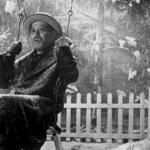 Review of Ain’t Them Bodies Saints, Directed by David Lowery
Review of Ain’t Them Bodies Saints, Directed by David Lowery
Read any review of David Lowery’s acclaimed new film Ain’t Them Bodies Saints and you’ll find comparisons of both style (voiceover narration, elliptical editing) and setting (Texas landscapes) to filmmaker Terrence Malick (The Tree of Life, Days of Heaven). Malick set both Tree and Heaven largely in the Lone Star state, but Lowery, when asked about what influenced him in writing and directing Saints, never mentions Malick, citing other cinematic influences.
Lowery expanded on his influences in the film’s press notes:
Q: Were there films that inspired you when you approached this film at any point during the script or shooting phase?
A: All sorts. [Robert] Altman’s McCabe & Mrs. Miller was a big one, in terms of tone and the way it turned a simple archetypal story on its belly and got into the nitty gritty of it all. There Will Be Blood was an inspiration. The films of Claire Denis – their formalism and their surprising warmth – were things we looked at. But more than film, I think we took a lot from music. The songs of Bill Callahan, Bonnie Prince Billy and Joanna Newsom all played a vital part in the making of the movie. Literature, too: Marilynne Robinson’s books, Home and Gilead, along with some of Cormac McCarthy’s novels, definitely seeped into my fingers a little while I was writing the script.
Lowery’s influences are outstanding. Ain’t Them Bodies Saints is not. The provocatively titled film does little to transcend its inspirations. Instead of synthesizing similarly styled films and creating something new as a result, Saints simply reminds us of those earlier influences—and pales in comparison.
“This was in Texas,” reads an opening title card. A halo of light around a woman’s head and, in voiceover, the words, “You gonna leave me?” quickly bring to mind Malick’s Tree of Life, with Jessica Chastain’s back-lit heavenly matron, and the longings of stumbling lovers in To the Wonder. In Saints, Ruth (Rooney Mara) shoots a police officer, but Bob (Casey Affleck) takes the fall for the shooting. Before his imprisonment, he promises Ruth, “I’ll come get you. Just wait for me.”
Saints is the story of what happens while Ruth waits—she has Bob’s child, and she’s pursued romantically by a local law officer, Patrick Wheeler (Ben Foster)—and what happens after Bob breaks out of prison and fulfills his promise to return to Ruth.
There’s not much more to the story, despite dialogue that hints at spiritual content the film never explores in any depth (“I’ve got a higher calling.” “I’ll have to answer to God.” “I used to be the devil.”).
More fundamental is the question of how we’re to feel about Bob’s promised reunion with Ruth. Yes, Bob has said he would return to Ruth, but we see her moving on with her life while Bob is locked up. She seems happy as a single mom, and Wheeler appears ready to take on a fatherly role for her daughter. That makes Ruth’s continued commitment to Bob somewhat mystifying.
Saints is also another head-scratching film in which the small-town girl with movie-star good looks somehow manages for years to attract little to no interest from the men in the town. That might go down easier in a Hollywood fairy tale, but in a film so dependent on the authenticity of its setting and characters, it’s a flaw.
Mara does her best with the role as written, and Affleck conveys the determination of a man with misguided commitments. But the film’s finest performance is from Keith Carradine as a shopkeeper with ties to the outlaw couple. The veteran character actor, who starred in Altman’s similar, superior story of lovers and the law, Thieves Like Us (which is itself indebted to Arthur Penn’s Bonnie and Clyde), hasn’t made such a strong impression on the big screen in decades.
That’s not enough to salvage Ain’t Them Bodies Saints, which never transcends Thieves Like Us, Bonnie and Clyde, or any of the Malick films that clearly influenced Lowery. It sends us out of the theater wanting to return to those better films, rather than pushing into new, uncharted storytelling territory.
At least the music is nice.












